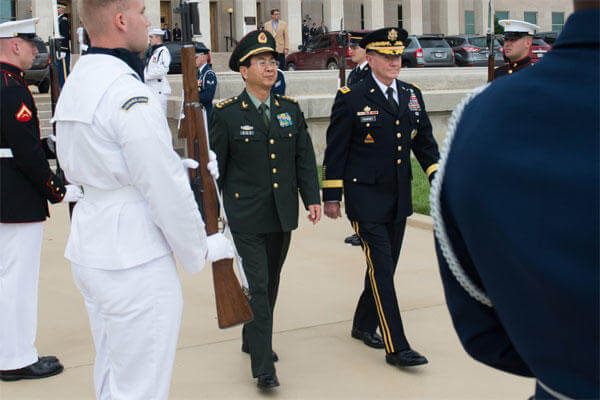A top Chinese general Thursday strongly defended Beijing's territorial claims over disputed islands in the South and East China Seas and charged that the U.S. rebalance of forces to the Pacific was encouraging unrest in the region.
Gen. Fang Fenghui, chief of the general staff of the People's Liberation Army, said "the rebalancing strategy of the U.S. has stirred up some of the problems which make the South China Sea and the East China Sea not so calm as before."
Fang warned that China would respond to any attempts by Vietnam, Japan or other neighbors to assert their own claims over the disputed islands and reefs.
"We do not create trouble but we are not afraid of trouble," Fang said at a Pentagon news conference after meetings with Gen. Martin Dempsey, chairman of the Joint Chiefs of Staff.
Dempsey appeared to be slightly irritated as he waited to comment while listening to a long-winded response by Fang on the current dispute with Vietnam over offshore oil drilling rights.
"Thank you for giving me the time to formulate my answer," Dempsey told Fang.
When his turn finally came, Dempsey dismissed Fang's objections to the so-called "Pacific pivot" and said the U.S. was committed to the policy.
"We'll go because we can and should, and we'll go because we have to," Dempsey said of the rebalance. Dempsey also told Fang "We will respond to threats."
However, Dempsey mostly stuck to his long-held position that the U.S. must build better military-to-military relations with China to avoid miscalculations that could lead to conflict in the region.
Fang came to the Pentagon after meeting at Naval Base San Diego with Adm. Samuel Locklear, head of the Pacific Command. Dempsey met with Fang, China's No. 3 military leader, last year in China and was returning the favor by inviting him to Washington.
At the opening of the news conference, Dempsey noted that China's claims in the South China Sea could be seen as "provocative," the same term used in recent days by the State Department.
Fang responded at length, blaming Vietnam for the current dispute over China's movement of a $1 billion oil rig into territorial waters claimed by Hanoi. The action by China triggered widespread protests in Vietnam in which foreign factories were set ablaze and a Chinese national allegedly was killed.
Fang charged that other nations he did not name had drilled for oil in the same region but complaints only surfaced when China sought to do the same.
"We believe the ones provoking those issues in the South China Sea are not China," Fang said in an apparent rebuff to Dempsey. "When China does drill, we instantly become a threat."
Vietnam officials have charged that Chinese ships have rammed Vietnamese Coast Guard vessels attempting to patrol near the oil rig, but Fang said the Vietnamese ships were attempting to interrupt the drilling.
"That is something that we cannot accept," Fang said. "We will make sure that this well will be successfully drilled," he said.
Fang also made China's case in a separate dispute over disputed reefs and shoals with the Philippines, and accused Japan of reverting to World War II militarism in asserting its claims to disputed uninhabited islands called the Senkaku by Japan and the Diaoyu by China.
Fang said the Japanese claims were also encouraged by the U.S. rebalance of forces. "This is something that we can never agree (upon)," Fang said.
Despite their disagreements, both Dempsey and Fang noted that China next month for the first time will send ships to participate in the annual Rim of the Pacific (RIMPAC) exercises off Hawaii.
-- Richard Sisk can be reached at richard.sisk@monster.com





























